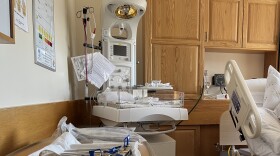If you walked into Jessica Aviles’ Campton living room, you’d notice the pieces by local artists and state trail maps, and you'd probably think the family of six has lived in New Hampshire for years. But they moved here six months ago from Wesley Chapel, Florida because of their youngest son, Gabe.
Though they love New Hampshire’s hiking and small schools, Gabe was diganosed with Duchenne muscular dystrophy when he was only 11 months old. One of the best doctors to treat the disease is in Worcester, Massachusetts.

Gabe’s muscles can’t repair or rebuild themselves. Over time, they break down, even the heart and lungs.
“Nobody’s ever survived it,” Aviles says. “But there are people who are starting to live into their 20s and even a couple into their 30s.”
For years, the family flew from Tampa to Massachusetts every 6 months. Those four to five day trips involved a lot of care. Gabe saw doctors in different departments, from neurology, to cardiology, and pulmonology. Together, they’d plan for the next six months.
It was possible to complete two trips a year due to donated airline miles from the family’s church. But the COVID-19 pandemic changed everything.
Last summer, Gabe’s doctor told Aviles an in-person visit was impossible. While telehealth is a good option for some patients, Aviles knew it wouldn’t be right for Gabe. She says he’s at an age where kids with Duchenne's tend to regress.
”If anything were to pop up, they're not going to find it looking at him through a computer,” she says. At that point, the family had no idea how long the pandemic would last, so they decided to move to New England. After staying in Vermont for several months, the family found the perfect house in Campton.
It was quickly clear that the family made the right choice. Aviles feels the heart issue the doctor found at their next appointment would have been missed virtually. He’s now taking two different cardiac medications, which Aviles says helps. “But he was in cardiac failure,” Aviles notes. ”We're very glad we [moved] because it potentially saved his life.”

After the move, Aviles' life in New Hampshire found a new rhythm, because she isn't balancing her work life and home life. For the first time in over 30 years, Aviles, almost 46, doesn't hold a job.
In Florida, she worked as a director for her church. Her mother, her husband’s sisters and friends all helped her care for her kids.
But in New Hampshire, that community isn’t around. While not working outside the home has been isolating, she says it’s felt freeing in other ways.
“It's hard for any parent to juggle a job and kids,” Aviles says. "But when you're also trying to make the best of however many years you have with one kid, it's just always on a loop in your head.”
She says it felt like there was a never-ending pull between her work life and home life. “Always when you're at work, you feel like you should be at home. When you're at home, you feel like you should be at work.” But that cycle has stopped.
Her husband, Ivan, works remotely at the same Tampa software company he was at before they moved. The family lives on just one salary now. During the pandemic, the family has spent more time at home or hiking outdoors, which has helped them save money.
But the biggest savings have come from fewer medical expenses, because Gabe’s now on Medicaid. In Florida, the family couldn’t get Gabe a Medicaid waiver. Despite her husband’s insurance, they paid thousands of dollars for treatments that were only partially covered, or out-of-pocket entirely.
New Hampshire Medicaid, she says, covers more of Gabe’s therapies and picks up some of the bills private insurance does not.
Back in Florida, Aviles was advocating for better coverage for kids with Duchenne’s. Seeing what her son can access now intensified her efforts, even though the family isn't there anymore.
“I'm not done fighting the government in Florida,” she says.
New Hampshire Medicaid also covers care for Gabe from a licensed nursing assistant (LNA), which offered Aviles an idea.
In the fall, she’s planning to go back to school to become an LNA, and her local nursing agency could hire her to work in that role with Gabe. At first, Aviles says “it sounded too good to be true.” But she says her resource coordinator told her Gabe qualifies, and there aren’t enough LNA’s in New Hampshire, so she could do the job.
“And I was like, this is nuts. Why wouldn't I do this?” Aviles says.
Jessica Aviles is one of six women NHPR will follow as part of Overtime. And we want you to add your voice. How are you managing the needs of caregiving and work during the pandemic? What is changing for you as the pandemic fades?








